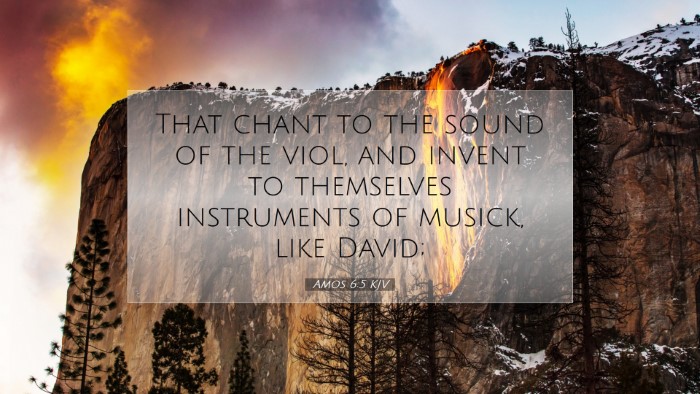Old Testament
Genesis Exodus Leviticus Numbers Deuteronomy Joshua Judges Ruth 1 Samuel 2 Samuel 1 Kings 2 Kings 1 Chronicles 2 Chronicles Ezra Nehemiah Esther Job Psalms Proverbs Ecclesiastes Song of Solomon Isaiah Jeremiah Lamentations Ezekiel Daniel Hosea Joel Amos Obadiah Jonah Micah Nahum Habakkuk Zephaniah Haggai Zechariah MalachiAmos 6:5
Amos 6:5 KJV
That chant to the sound of the viol, and invent to themselves instruments of musick, like David;
Amos 6:5 Bible Commentary
Commentary on Amos 6:5
Verse: "That chant to the sound of the viol, and invent to themselves instruments of music, like David." (Amos 6:5)
Introduction
In Amos 6:5, the prophet addresses the prevailing attitudes among the Israelites, particularly the elite of the northern kingdom. This verse paints a picture of a society that indulges in excessive luxury while neglecting their spiritual responsibilities and the plight of the oppressed. Drawing upon the public domain commentaries from Matthew Henry, Albert Barnes, and Adam Clarke, we will explore the deeper meanings and implications of this verse in its historical and theological context.
Context of Amos
The Book of Amos, authored by a shepherd and farmer from Tekoa, is often characterized by its social criticism and prophetic warnings. Amos lived in a time of relative prosperity for Israel but also of considerable moral decay. His messages transcend his era and speak into the lives of believers today. The verse in question epitomizes the disconnect between lavish living and a heedless spirit in the face of social injustice.
Analysis of the Verse
Chanting and Music
The phrase "that chant to the sound of the viol" suggests a society that places a significant emphasis on music and celebrations. Matthew Henry notes that music, while a gift from God meant for worship, can become a source of distraction when used outside its intended purpose. The wealthy were preoccupied with their festivities while ignoring the moral decay around them.
Inventing Instruments
The term "invent to themselves instruments of music, like David" underscores a creative expression in worship and celebration. Adam Clarke reflects on how David was not only a king but also a worshipper who understood the importance of music in glorifying God. However, the context here implies a misplaced focus—as the people innovate for their entertainment, they ignore the divine mandates for justice and righteousness.
Theological Implications
This verse raises significant theological questions regarding the nature of worship and its implications for daily life. Albert Barnes comments on how music in worship should lead to a deeper spiritual engagement rather than serve as mere entertainment. The Israelites were misusing their musical talents, highlighting a broader issue of spirituality versus materialism.
Disconnect Between Worship and Life
The disconnect between their external worship (music and celebration) and internal morality is striking. The people of Israel were living in excess while failing to see the social injustices around them. Matthew Henry cautions believers against the dangers of a superficial faith that emphasizes ritualistic expressions while neglecting genuine repentance and care for others.
Idolatry of Wealth and Comfort
Amos' lament serves as a reminder of the dangers posed by wealth. The creativity in musical invention serves as a metaphor for a society intoxicated by luxury. Adam Clarke emphasizes that when comfort and prosperity become idols, they lead to spiritual apathy. The people, therefore, are invited to reflect genuinely on their priorities and the state of their spiritual lives.
Practical Applications
For pastors, students, and theologians today, Amos 6:5 is a clarion call to examine the state of our own worship practices and priorities. Are our lives characterized by genuine devotion to God or merely by religious performance? This verse challenges us to ensure our worship leads to transformative action in the world and among those who are marginalized and oppressed.
- Emphasis on Justice: True worship must spring from a heart attuned to the needs of others. As the body of Christ, we are called to advocate for justice and act in compassion.
- Balance in Worship: Creativity in worship—expressed through music, art, and service—should never overshadow the fundamental call to live righteously.
- Warning Against Complacency: The Israelites were complacent; thus, believers today must be wary of the comforts of modern life that may lead to spiritual lethargy.
Conclusion
In Amos 6:5, the call to reflect on our priorities in the context of worship and social responsibility remains profoundly relevant. The prophetic message of Amos prompts all believers to seek transformation that aligns our actions with our songs and our lives with our faith. As we engage with this verse, we are reminded to cultivate a spirituality that seeks the welfare of our neighbors and reflects the heart of God in a world that often neglects the cries of the oppressed.


